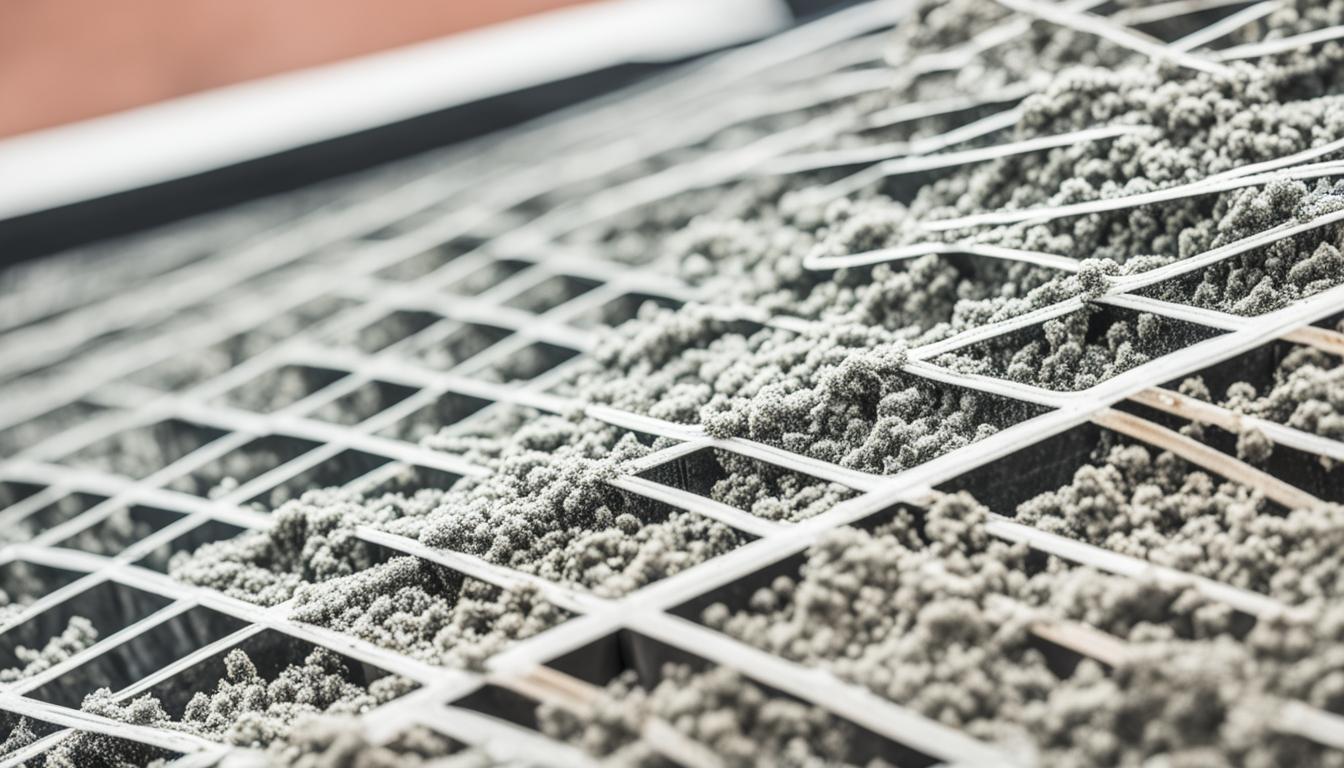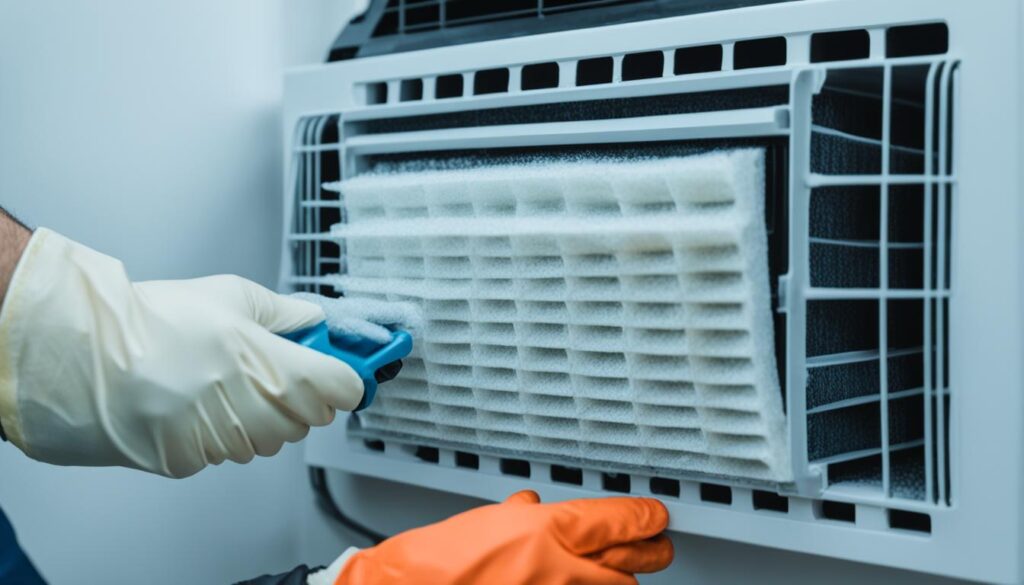
Mold in Air Conditioner: Risks and Solutions
Welcome to our comprehensive guide on black mold in air conditioners. In this article, we will explore the risks associated with black mold growth in air conditioning systems and provide practical solutions for combating this issue. As the summer season approaches and temperatures rise, it is crucial to ensure that your air conditioner remains free from mold to safeguard your health and maintain a clean indoor environment.
Black mold is a common problem in air conditioners, particularly in humid climates or areas with poor ventilation. If left untreated, it can pose significant risks to both your air conditioner’s efficiency and your well-being. Mold spores released by black mold can irritate the respiratory system, leading to allergies, asthma, and other respiratory issues. Additionally, prolonged exposure to black mold can cause headaches, fatigue, and even more severe health complications.
To effectively address this issue, it is essential to understand the causes behind black mold growth in air conditioners. Factors such as high humidity levels, water leaks, inadequate ventilation, and improper maintenance can create the perfect breeding ground for mold. By identifying these causes, you can take proactive measures to prevent black mold before it becomes a more significant problem.
In the following sections, we will discuss in detail the causes of black mold in air conditioners and provide effective solutions for preventing its growth. From regular cleaning and maintenance practices to humidity control and ventilation strategies, we will equip you with the knowledge needed to ensure a mold-free air conditioning system. We will also highlight the importance of professional mold assessments and remediation services, such as those offered by Fix Mold Miami, to address severe cases of black mold.
Remember, addressing black mold in your air conditioner not only protects the efficiency of your system but also safeguards your health and well-being. By implementing the preventive measures and solutions outlined in this article, you can enjoy cool and clean air throughout the summer without the risks associated with black mold.
Key Takeaways:
- Black mold in air conditioners can pose risks to both your system’s efficiency and your well-being. It is crucial to address this issue promptly.
- Causes of black mold in air conditioners include high humidity, water leaks, poor ventilation, and inadequate maintenance.
- Preventive measures such as regular cleaning, maintenance, humidity control, ventilation strategies, and professional mold assessment services can help in preventing black mold growth.
- Fix Mold Miami offers expert mold assessment and remediation services for severe cases of black mold.
- Addressing black mold in your air conditioner ensures a healthy and clean indoor environment for you and your family.
Understanding the Causes of Black Mold in Air Conditioners
Black mold in air conditioners can pose serious risks to both your home environment and your health. It is important to understand the causes behind its growth to effectively prevent and address this issue. In this section, we will explore the various factors that contribute to the development of black mold in air conditioning systems.
1. High Humidity: Excessive moisture in the air can create an ideal breeding ground for black mold. Air conditioners that do not effectively control humidity levels can contribute to mold growth.
2. Water Leaks: Any water leaks in your air conditioning system, such as from condensation or a malfunctioning drain pipe, can result in moisture accumulation. This moisture provides the necessary conditions for black mold to thrive and spread.
3. Poor Ventilation: Inadequate airflow within the air conditioning system can lead to stagnant air and trapped moisture. Insufficient ventilation not only promotes black mold growth but also reduces the efficiency of the system.
4. Inadequate Maintenance: Neglecting regular cleaning and maintenance of air conditioners can result in dirt, dust, and debris accumulation. These organic materials, combined with moisture, serve as food sources for black mold, allowing it to flourish within the system.
“When moisture and organic sources like dirt or dust settle and linger in the air conditioner, black mold can take hold and start spreading. It is crucial to address these issues promptly to prevent further damage and ensure a clean and healthy air conditioning system.”
By understanding these causes, you can take proactive measures to prevent black mold growth in your air conditioner. Regular maintenance, prompt repair of leaks, proper ventilation, and humidity control are essential for combating this issue. In the next section, we will discuss effective solutions for preventing black mold in air conditioners.
Solutions for Preventing Black Mold in Air Conditioners
To ensure a healthy and mold-free environment, it is crucial to implement effective prevention strategies for combating black mold in air conditioners. By following a few simple steps, you can significantly reduce the risk of mold growth and maintain clean, fresh air in your home.
Regular Cleaning and Maintenance
Regular cleaning and maintenance of your air conditioner are essential in preventing the growth of black mold. Here are some key practices to incorporate into your routine:
- Remove and clean the air filters regularly to prevent the accumulation of dust, pollen, and moisture that can contribute to mold growth. Consider replacing disposable filters every three months.
- Clean the condensate drain lines to ensure proper water drainage and prevent the buildup of excess moisture.
- Inspect and clean the evaporator coils to remove dirt and debris, as these can serve as breeding grounds for mold.
Proper Humidity Control
Mold thrives in moist environments, so maintaining the humidity levels in your home is crucial for mold prevention. Follow these tips to control humidity:
- Keep indoor humidity levels below 50% to hinder mold growth. Invest in a hygrometer to monitor humidity and a dehumidifier to reduce excess moisture if needed.
- Ensure proper ventilation in your home by utilizing exhaust fans in kitchens, bathrooms, and laundry areas.
- Avoid overwatering indoor plants, as excess moisture can increase humidity levels.
Effective Ventilation Strategies
Improper ventilation can contribute to stagnant air and moisture buildup, creating an ideal environment for black mold. Consider the following ventilation strategies:
- Open windows and doors periodically to allow fresh air circulation, especially during periods of high humidity.
- Utilize ceiling fans to improve air circulation and prevent the buildup of stagnant air.
- Ensure that the air conditioning unit is properly sized for your space. An oversized unit can lead to short cycles, reducing its ability to dehumidify the air effectively.
Importance of Using High-Quality Air Filters
Investing in high-quality air filters is key to preventing black mold in air conditioners. Opt for filters with a high Minimum Efficiency Reporting Value (MERV) rating to filter out mold spores, pollen, and other allergens. Regularly replace the filters to maintain their efficiency in trapping mold particles.
Incorporating these prevention strategies into your air conditioner maintenance routine will greatly reduce the risk of black mold growth, ensuring a healthier and more comfortable indoor environment for you and your family.

| Prevention Steps | Effectiveness |
|---|---|
| Regular cleaning and maintenance | Highly effective |
| Proper humidity control | Essential |
| Effective ventilation strategies | Crucial |
| Use of high-quality air filters | Important |
Conclusion
In conclusion, addressing black mold in air conditioners is crucial for safeguarding your home and your health. The presence of black mold in these systems poses significant risks, including respiratory issues, allergies, and even long-term health complications. Therefore, it is imperative to take proactive measures to prevent and eliminate black mold growth.
We have discussed the various causes of black mold in air conditioners, such as high humidity, water leaks, poor ventilation, and inadequate maintenance. By understanding these factors, you can implement effective solutions to mitigate mold growth and maintain a healthy indoor environment.
To prevent black mold in air conditioners, regular cleaning and maintenance practices are essential. This includes cleaning or replacing air filters, checking for leaks and moisture accumulation, and ensuring proper ventilation. Additionally, controlling humidity levels and using high-quality air filters can significantly reduce the risk of mold growth.
If you suspect black mold in your air conditioner or need professional assistance in assessing and remedying mold issues, contact Fix Mold Miami at 305-465-6653. Their expert team can provide a thorough mold assessment and specialized remediation services to ensure a mold-free living space in Florida.




